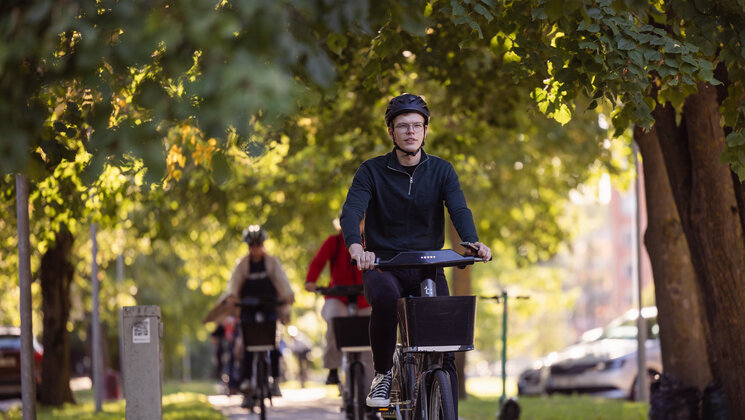University of Tartu to lead six Estonian centres of excellence in research

Over the next seven years, the government will fund ten centres of excellence addressing scientific issues of importance to Estonia. The University of Tartu leads six of them and participates as a partner in all other centres of excellence that are starting work now.
Centres of excellence bring together high-level research teams from different research fields and institutions to achieve high-level international research results, considering the needs of Estonian society and economy. The new centres of excellence led by the University of Tartu focus on research in green hydrogen and energy technologies, artificial intelligence, personalised medicine, population and culture, well-being sciences and sustainable land use.
As a partner, the university participates in a centre of excellence led by the Estonian University of Life Sciences, which explores methods to reduce the environmental impact of new crops and food production suited to future climates. The university also participates in centres of excellence led by Tallinn University of Technology, one of which develops technologies for circular economy and the other works on energy-efficient construction methods. University of Tartu research teams are also involved in the Centre of Excellence for Fundamental Universe Studies, led by the Institute of Chemical and Biological Physics. This centre deals with topics ranging from fundamental particle physics and cosmology to new-generation machine learning algorithms and potential quantum computing applications in basic research.
According to Mari Moora, Vice Rector for Research of the University of Tartu, the new centres for excellence focus on important issues of international relevance, and using local data to find solutions is valuable in shaping Estonia’s future. “The University of Tartu has a leading role in the Estonian research landscape. This is confirmed by the fact that the university participates in all the new centres of excellence, and the number of centres of excellence led by the university has doubled compared to the previous funding period. It is also pleasant that strong research teams from all our fields of research are involved in the centres,” said Moora.
- The University of Tartu participates in all the new centres of excellence.
- The number of centres of excellence led by the university has doubled compared to the previous funding period
- Strong research teams from all our fields of research are involved in the centres.
The Centre of Excellence in Sustainable Green Hydrogen and Energy Technologies, led by Professor of Physical Chemistry Enn Lust, focuses on developing novel energy conversion and storage devices. A demo centre will be set up to showcase advanced hydrogen and energy generation and storage devices, demonstrate them in operation, and cooperate with companies to find ways to produce new devices and bring technologies to market. Tallinn University of Technology has been involved in the work of the centre of excellence as a partner.
The Estonian Centre of Excellence in Artificial Intelligence, led by Associate Professor in Machine Learning Meelis Kull, advances innovative methodologies that help develop reliable AI systems. These methodologies are applied to increase AI capabilities in key Estonian sectors, including e-governance, healthcare, business process management, and cybersecurity. Tallinn University of Technology and Cybernetica AS are partners in the centre of excellence.
The Centre of Excellence for Personalised Medicine, led by Professor of Bioinformatics Reedik Mägi, focuses on preventing and alleviating health problems in an ageing population. This will be done by developing risk models for predicting diseases, taking into account the individual’s origin, living and cultural environment, and by looking for biomarkers associated with diseases. Special attention is given to issues of population involvement because when implementing personalised medicine, it is essential for people to understand their central role and responsibility in keeping healthy. For example, the researchers will look into what people expect from the medical system and what steps they are willing to take to maintain their health. Tallinn University, OÜ ProtoBioS, and the Competence Centre on Health Technologies are involved in the centre of excellence as partners.
In Estonian Roots: Centre of Excellence for transdisciplinary studies on ethnogenesis and cultural diversity, led by Professor of Archaeogenomics Kristiina Tambets, researchers of the humanities and scientists cooperate to clarify the formation of cultural and genetic diversity in Estonia and neighbouring areas. Based on precise data from archaeogenetics, studies of culture and linguistics, and paleoecology, the centre of excellence will generate new knowledge on the evolution of the population and the unique culture of these areas in the European context. Tallinn University of Technology and the Estonian Literary Museum participate in the project as partners.
The Estonian Centre of Excellence of Well-being Sciences, led by Professor of Affective Psychology Andero Uusberg, will bring together social and natural scientists who study people and the contexts in which they operate to find new methods to measure, understand and influence human well-being. Improving well-being is both an end in itself and a means to support economic growth, democracy, societal resilience and other values of society. Tallinn University of Technology and Tallinn University are involved in the centre of excellence as partners.
The Centre of Excellence of Sustainable Land Use is led by Evelyn Uuemaa, Professor of Geoinformatics, and focuses on novel land use planning to preserve biodiversity and ensure carbon balance. Field data, satellite data and machine learning are used for identifying and modelling the relationships between the carbon cycle and biodiversity. Socioeconomic analysis is used to assess the attitudes of landowners and land users and the feasibility of the new land-use approaches. Other members of the centre of excellence are the Estonian University of Life Sciences and the Centre of Estonian Rural Research and Knowledge.
The Ministry of Education and Research supports the work of each centre of excellence with 7 million euros.






